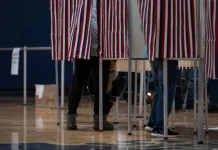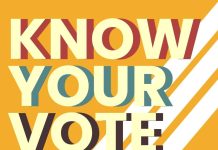Advisers see opportunities for learning, making mistakes
By Catherine Mclaughlin, the Laconia Daily Sun
PLYMOUTH — Does the state’s right-to-know law apply to student governments at state universities?
At one University System of New Hampshire school, the student newspaper was at loggerheads with the student government this fall over that very question.
In September, Plymouth State University’s newspaper, The Clock, restarted its coverage of the student government association for the first time since the COVID-19 pandemic. At the first meeting reporters attended, when the body arrived at a money-related vote — student governments are responsible for approving funding for clubs that comes out of the student activity fee, a part of tuition — they were told they had to leave.
“We objected to that,” editor-in-chief Jacob Downey said. “It just seemed like something that’s not supposed to happen.”
Members of the student government could not point to a bylaw stating when certain parts of their meetings could be private, Downey said, and the reporters argued that their representatives had to follow the open meeting rules in the state’s right-to-know law, RSA 91-A.
Friction mounted between the two groups: The Clock wrote two editorials criticizing the student government association.
“If the laws governing every other public body in the state are not good enough for SGA, then perhaps the organization cannot function,” one read.
The Clock points to section 1-a, VI of the law, which lays out which groups qualify as a “public body” and are therefore required to hold public meetings. According to that section, a public body includes:
“Any board or commission of any state agency or authority, including the board of trustees of the University System of New Hampshire and any committee, advisory or otherwise, established by such entities;”
“Any legislative body, governing body, board, commission, committee, agency, or authority of any county, town, municipal corporation, school district, school administrative unit, chartered public school, or other political subdivision, or any committee, subcommittee, or subordinate body thereof, or advisory committee thereto.”
Because it allocates funds to student clubs on behalf of the school, makes recommendations that influence Plymouth State’s leadership and because it has representation on the USNH board of trustees, The Clock believes PSU’s student government meets one or both of those definitions.
Mike Hiestand, senior legal counsel at the Student Press Law Center, a nonprofit that provides education and advice to high school and college journalists, agreed with their argument.
“The school would normally be responsible for determining how those funds are used,” Hiestand said. “They stand in the place of the university.”
The organization’s online guide for students in New Hampshire states, “There has been no litigation on whether the statute applies to a student government. But based on the broad language, a court would likely hold that student governments are subject to the act.”
USNH and the student government disagreed.
“91-A’s open meeting provisions apply to USNH’s board of trustees and its committees. They do not apply to student governments because they are part of the educational programs of USNH institutions,” Lisa Thorne, USNH director of communications, wrote in response to a list of written questions.
Plymouth State agreed to share interview requests with leadership of the student government. No students responded.
Right to Know NH, a nonprofit that offers training and advice about 91-A compliance, agrees with USNH’s stance, according to its president, Katherine Kokko.
“A student government does not meet the definition of a public body or a public agency and therefore can’t be held to the standards of 91-A,” Kokko said. “They’re not an extension of the governing body that oversees the institution.”
The legal question about the applicability of 91-A is formally unresolved. The Daily Sun could find no record of right-to-know cases aimed at student governments, and the Attorney General’s Office’s 2015 right to know guide does not address the question.
The debate, more broadly, is also a window into how both student newspapers and student governments are arenas for their members to incubate the skills and instincts for potential futures in those fields. The pandemic was a major disrupter to many student organizations, severing current members from institutional knowledge and guidance from older peers, and many student organizations are still in the early stages of rebuilding.
When she was a student at the University of New Hampshire, Kokko served as student body president and as a UNH representative on the USNH board of trustees. Though not specifically adhering to the letter of 91-A, she said, student governments should seek to apply the transparency principles of actual governments.
“There needs to be some room for students to make mistakes, and not necessarily be subjected to the same level of scrutiny as, say, an actual public governing body,” Kokko said. “But part of the purpose of student government, and any student activity really, is to give students an experience as close to the real world as as they can have … so they should be mirroring, as closely as feasible, what they’re seeing out in the public eye.”
A key step toward striking that balance, she said, would be for student governments to have clear guidelines about when they are allowed to enter closed sessions.
This is largely what happened at PSU: In October, the student government passed a resolution that stated its votes would be taken in public session and outlined situations where leadership could deem it appropriate to enter a closed-door meeting, according to reporting in The Clock.
While that was a productive change, Downey, there are wrinkles still being ironed out.
Namely, the SGA asks reporters to use New Hampshire’s two-party consent laws and get all representatives’ permission to record meetings, Downey said. On more than one occasion, that permission has been denied.
Jessica Dutille, director of student life and community impact at Plymouth State, oversees all student clubs and is one of two faculty advisers for the SGA.
“Across the board, I think we are still in a rebuilding mode,” Dutille said. “Membership dropped off, we had many leaders graduate, and so some of that institutional knowledge wasn’t passed down in the way it usually is from leader to leader.”
Having lost most of its staff, its office and its print publication during the pandemic, The Clock had not covered student government in several years.
“Having members of the press sitting in on their meetings, listening in, recording, writing articles and naming them in those articles,” Dutille said, “It certainly wasn’t something our current SGA members were used to.”
“If this is an open-door meeting, and decisions are being made here that affect the student body, you forfeit that reasonable expectation of privacy,” Downey said. “It makes the work we do as a student paper really difficult.”
Downey reached out to peers at Keene State College for advice.
The 91-A question never came up there, Keene State’s The Equinox told The Daily Sun, because its student government rarely, if ever, attempts private sessions. Regardless of whether 91-A applies, Managing Executive Editor Tim Bruns said, the creation of an effective learning environment for both journalists and representatives should match what they’ll experience after college.
“I would assume that some people running for student government, they might be into politics, and they might see a future in local politics or state politics,” Bruns said. “If we get transparency from filming our local officials or state officials and even our national officials, I think we should get transparency from student government.”
“I think it’s a healthy thing,” Dutille said. “They are elected into these positions and their public positions, they are representing their constituency groups. Many of them want to go on to careers in public service. And I do think that this is a great opportunity for that to learn how to engage with the press and how to increase the transparency.”
Right to Know NH is eager to connect with student governments, Kokko said. Though she doesn’t believe 91-A applies, its general principles, such as those laid out by the state supreme court in the 2020 Salcetti decision — a court case involving student journalists — can serve as a guide.
Kokko quoted the decision: “The salutary purpose of the Right-to-Know Law — ‘to ensure both the greatest possible public access to the actions, discussions and records of all public bodies, and their accountability to the people.’
“RSA 91-A:1 — is best served when the members of the public and the governmental bodies are guided by a spirit of collaboration.”
Despite that initial anxiety and discomfort by student representatives, the return of SGA coverage in The Clock makes both student groups stronger, Dutille said. Students engage more with what SGA is doing when it appears in the newspaper, and covering meetings spotlights potential stories for reporters.
“I was really proud of The Clock for bringing this up. That’s a really great question to ask,” she said. “And I think SGA members are now communicating in that space in a more transparent way. It was a learning opportunity for everybody.”
These articles are being shared by partners in The Granite State News Collaborative. For more information visit collaborativenh.org.























